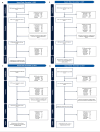Effectiveness of Single-Tablet Combination Therapy in Improving Adherence and Persistence and the Relation to Clinical and Economic Outcomes
- PMID: 38500521
- PMCID: PMC10948140
- DOI: 10.36469/001c.91396
Effectiveness of Single-Tablet Combination Therapy in Improving Adherence and Persistence and the Relation to Clinical and Economic Outcomes
Abstract
Background: Single-tablet combination therapies (STCTs) combine multiple drugs into one formulation, making drug administration more convenient for patients. STCTs were developed to address concerns with treatment adherence and persistence, but the impact of STCT use is not fully understood across indications. Objectives: We conducted a systematic literature review (SLR) to examine STCT-associated outcomes across 4 evidence domains: clinical trials, real-world evidence (RWE), health-related quality of life (HRQoL) studies, and economic evaluations. Methods: Four SLRs were conducted across the aforementioned domains. Included studies compared STCTs as well as fixed-dose combinations ([FDCs] of non-tablet formulations) with the equivalent active compounds and doses in loose-dose combinations (LDCs). Original research articles were included; case reports, case series, and non-English-language sources were excluded. Databases searched included EconLit, Embase, and Ovid MEDLINE® ALL. Two independent reviewers assessed relevant studies and extracted data. Conflicts were resolved with a third reviewer or consensus-based discussion. Results: In all, 109 studies were identified; 27 studies were identified in more than one SLR. Treatment adherence was significantly higher in patients receiving FDCs vs LDCs in 12 of 13 RWE studies and 3 of 13 clinical trials. All 18 RWE studies reported higher persistence with FDCs. In RWE studies examining clinical outcomes (n = 17), 14 reported positive findings with FDCs, including a reduced need for add-on medication, blood pressure control, and improved hemoglobin A1C. HRQoL studies generally reported numerical improvements with STCTs or similarities between STCTs and LDCs. Economic outcomes favored STCT use. All 6 cost-effectiveness or cost-utility analyses found FDCs were less expensive and more efficacious than LDCs. Four budget impact models found that STCTs were associated with cost savings. Medical costs and healthcare resource use were generally lower with FDCs than with LDCs. Discussion: Evidence from RWE and economic studies strongly favored STCT use, while clinical trials and HRQoL studies primarily reported similarity between STCTs and LDCs. This may be due to clinical trial procedures aimed at maximizing adherence and HRQoL measures that are not designed to evaluate drug administration. Conclusions: Our findings highlight the value of STCTs for improving patient adherence, persistence, and clinical outcomes while also offering economic advantages.
Keywords: cost-effectiveness; fixed-dose combination; loose-dose combination; real-world outcomes; single-tablet combination therapy.
Conflict of interest statement
C.P. is an employee of Janssen Pharmaceutical Companies of Johnson & Johnson and J.L. is an employee of Janssen-Cliag of Johnson & Johnson, both with stock or stock options at Johnson & Johnson. J.W. was an employee of Janssen Pharmaceutical Companies of Johnson & Johnson at the time of the study. D.T. and S.G. are employees of Cytel, Inc. K.G. was an employee of Cytel, Inc. at the time of the study.
Figures


References
-
- Adherence to treatment and related factors among patients with chronic conditions in primary care: a cross-sectional study. Fernandez-Lazaro Cesar I., García-González Juan M., Adams David P., Fernandez-Lazaro Diego, Mielgo-Ayuso Juan, Caballero-Garcia Alberto, Moreno Racionero Francisca, Córdova Alfredo, Miron-Canelo Jose A. Sep 14;2019 BMC Family Practice. 20(1):132. doi: 10.1186/s12875-019-1019-3. doi: 10.1186/s12875-019-1019-3. - DOI - DOI - PMC - PubMed
-
- Medication adherence, hospitalization, and healthcare resource utilization and costs in patients with pulmonary arterial hypertension treated with endothelin receptor antagonists or phosphodiesterase type-5 inhibitors. Frantz Robert P., Hill Jerrold W., Lickert Cassandra A., Wade Rolin L., Cole Michele R., Tsang Yuen, Drake William III. Jan;2020 Pulmonary Circulation. 10(1):2045894019880086. doi: 10.1177/2045894019880086. doi: 10.1177/2045894019880086. - DOI - DOI - PMC - PubMed
-
- Adherence to disease-specific drug treatment among patients with pulmonary arterial hypertension or chronic thromboembolic pulmonary hypertension. Kjellström Barbro, Sandqvist Anna, Hjalmarsson Clara, Nisell Magnus, Näsman Per, Ivarsson Bodil. Oct;2020 ERJ Open Research. 6(4) doi: 10.1183/23120541.00299-2020. doi: 10.1183/23120541.00299-2020. - DOI - DOI - PMC - PubMed
Publication types
LinkOut - more resources
Full Text Sources
